
Aachen II is an electoral constituency represented in the Bundestag. It elects one member via first-past-the-post voting. Under the current constituency numbering system, it is designated as constituency 87. It is located in western North Rhine-Westphalia, comprising the area of Städteregion Aachen outside the city of Aachen.

Heidelberg is an electoral constituency represented in the Bundestag. It elects one member via first-past-the-post voting. Under the current constituency numbering system, it is designated as constituency 274. It is located in northwestern Baden-Württemberg, comprising the city of Heidelberg and the northern part of the Rhein-Neckar-Kreis district.

Neuwied is an electoral constituency represented in the Bundestag. It elects one member via first-past-the-post voting. Under the current constituency numbering system, it is designated as constituency 196. It is located in northern Rhineland-Palatinate, comprising the districts of Neuwied and Altenkirchen.

Worms is an electoral constituency represented in the Bundestag. It elects one member via first-past-the-post voting. Under the current constituency numbering system, it is designated as constituency 205. It is located in eastern Rhineland-Palatinate, comprising the city of Worms, the district of Alzey-Worms, and southern parts of the Mainz-Bingen district.

Mosel/Rhein-Hunsrück is an electoral constituency represented in the Bundestag. It elects one member via first-past-the-post voting. Under the current constituency numbering system, it is designated as constituency 199. It is located in central Rhineland-Palatinate, comprising the Cochem-Zell district, Rhein-Hunsrück-Kreis district, and the southern part of the Bernkastel-Wittlich district.

Ursula Groden-Kranich is a German politician of the Christian Democratic Union of Germany (CDU) who served as a member of the Bundestag from 2013 to 2021, representing the constituency of Mainz. She is also a member of Mainz City Council and was the local representative for Mainz-Hechtsheim between 2004 and 2014.

Koblenz is an electoral constituency represented in the Bundestag. It elects one member via first-past-the-post voting. Under the current constituency numbering system, it is designated as constituency 198. It is located in northern Rhineland-Palatinate, comprising the city of Koblenz, the eastern part of the Mayen-Koblenz district, and the western part of the Rhein-Lahn-Kreis district.
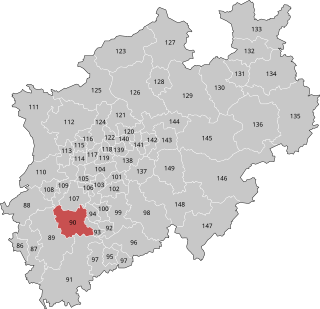
Rhein-Erft-Kreis I is an electoral constituency represented in the Bundestag. It elects one member via first-past-the-post voting. Under the current constituency numbering system, it is designated as constituency 90. It is located in western North Rhine-Westphalia, comprising most of the Rhein-Erft-Kreis district.
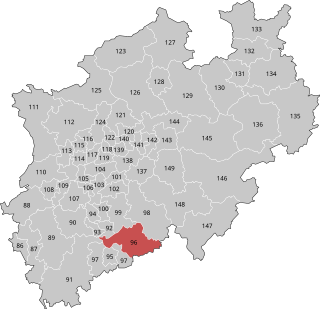
Rhein-Sieg-Kreis I is an electoral constituency represented in the Bundestag. It elects one member via first-past-the-post voting. Under the current constituency numbering system, it is designated as constituency 96. It is located in southwestern North Rhine-Westphalia, comprising the eastern part of the Rhein-Sieg-Kreis district.

Düsseldorf II is an electoral constituency represented in the Bundestag. It elects one member via first-past-the-post voting. Under the current constituency numbering system, it is designated as constituency 106. It is located in western North Rhine-Westphalia, comprising the southern part of the city of Düsseldorf.

Neuss I is an electoral constituency represented in the Bundestag. It elects one member via first-past-the-post voting. Under the current constituency numbering system, it is designated as constituency 107. It is located in western North Rhine-Westphalia, comprising the southeastern part of the district of Rhein-Kreis Neuss.
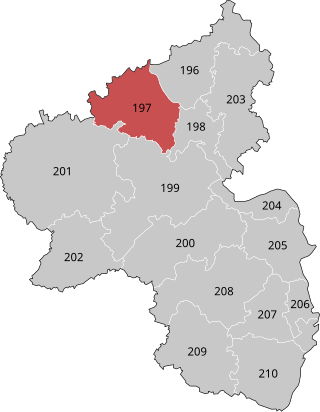
Ahrweiler is an electoral constituency represented in the Bundestag. It elects one member via first-past-the-post voting. Under the current constituency numbering system, it is designated as constituency 197. It is located in northern Rhineland-Palatinate, comprising the Ahrweiler district and the western part of the Mayen-Koblenz district.

Kreuznach is an electoral constituency represented in the Bundestag. It elects one member via first-past-the-post voting. Under the current constituency numbering system, it is designated as constituency 200. It is located in central Rhineland-Palatinate, comprising the districts of Bad Kreuznach and Birkenfeld.

Bitburg is an electoral constituency represented in the Bundestag. It elects one member via first-past-the-post voting. Under the current constituency numbering system, it is designated as constituency 201. It is located in northwestern Rhineland-Palatinate, comprising the Bitburg-Prüm district, Vulkaneifel district, and the northern part of the Bernkastel-Wittlich district.
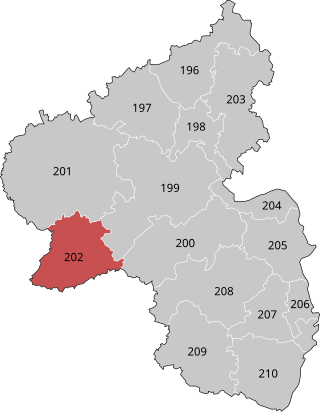
Trier is an electoral constituency represented in the Bundestag. It elects one member via first-past-the-post voting. Under the current constituency numbering system, it is designated as constituency 202. It is located in western Rhineland-Palatinate, comprising the city of Trier and the district of Trier-Saarburg.

Montabaur is an electoral constituency represented in the Bundestag. It elects one member via first-past-the-post voting. Under the current constituency numbering system, it is designated as constituency 203. It is located in northern Rhineland-Palatinate, comprising the district of Westerwaldkreis and the eastern part of the Rhein-Lahn-Kreis district.
Ludwigshafen/Frankenthal is an electoral constituency represented in the Bundestag. It elects one member via first-past-the-post voting. Under the current constituency numbering system, it is designated as constituency 206. It is located in southeastern Rhineland-Palatinate, comprising the cities of Ludwigshafen and Frankenthal and the northern part of the Rhein-Pfalz-Kreis district.
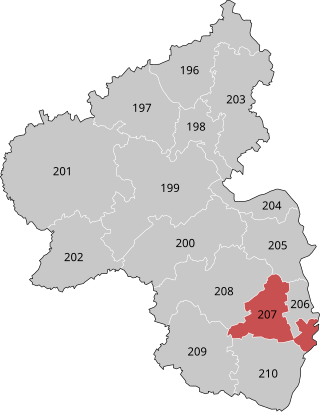
Neustadt – Speyer is an electoral constituency represented in the Bundestag. It elects one member via first-past-the-post voting. Under the current constituency numbering system, it is designated as constituency 207. It is located in southeastern Rhineland-Palatinate, comprising the cities of Neustadt an der Weinstraße and Speyer, the district of Bad Dürkheim, and the southern part of the Rhein-Pfalz-Kreis district.
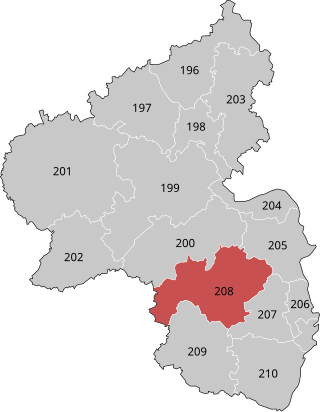
Kaiserslautern is an electoral constituency represented in the Bundestag. It elects one member via first-past-the-post voting. Under the current constituency numbering system, it is designated as constituency 208. It is located in southern Rhineland-Palatinate, comprising the city of Kaiserslautern, the Donnersbergkreis district, the Kusel district, and the northeastern part of the Landkreis Kaiserslautern district.

Pirmasens is an electoral constituency represented in the Bundestag. It elects one member via first-past-the-post voting. Under the current constituency numbering system, it is designated as constituency 209. It is located in southern Rhineland-Palatinate, comprising the cities of Pirmasens and Zweibrücken, the Südwestpfalz district, and the southwestern part of the Landkreis Kaiserslautern district.



















